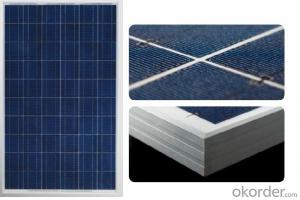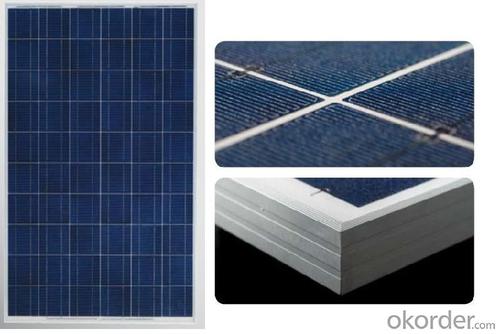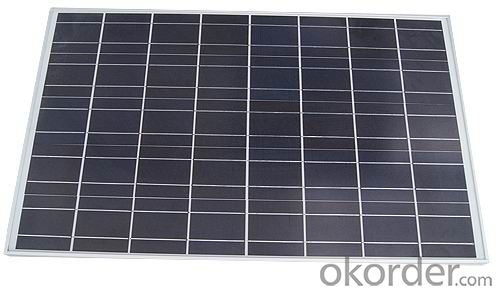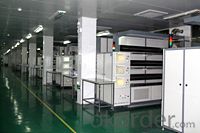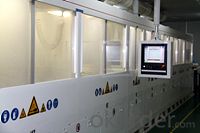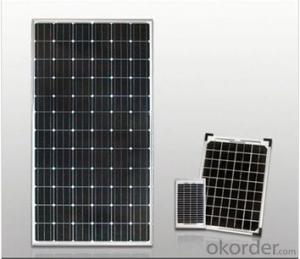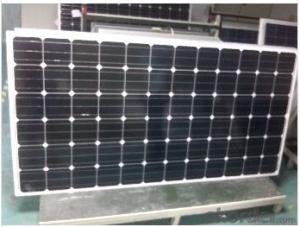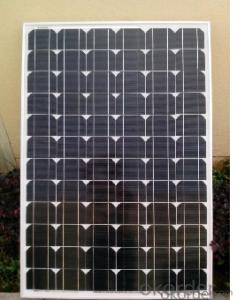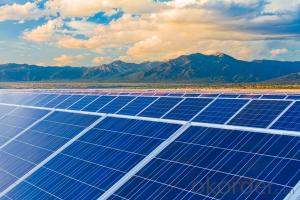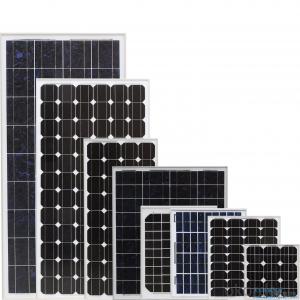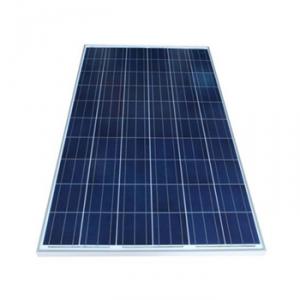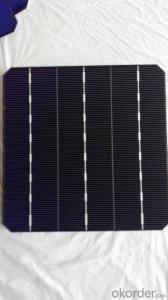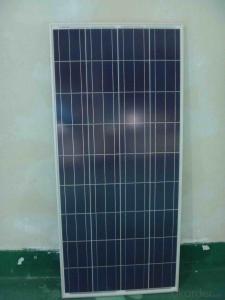Pa Solar Panels - Polycrystalline Solar Module TPB156x156-36-P
- Loading Port:
- Ningbo
- Payment Terms:
- TT OR LC
- Min Order Qty:
- 100 carton
- Supply Capability:
- 10000 carton/month
OKorder Service Pledge
OKorder Financial Service
You Might Also Like
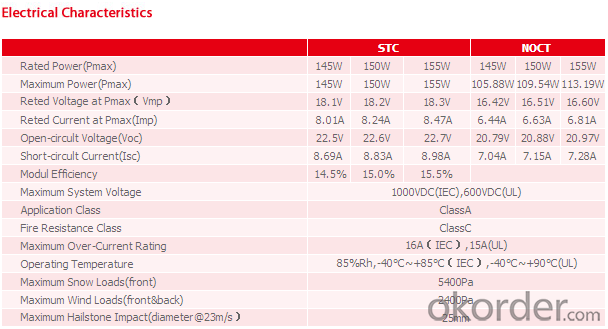
Specification:
· Highest performance enabled by higher efficiency monocrystal line cells and the latest Solar Wafer Technology for multicrystal line cells
· Lower weight design which reduces the total system load on a roof, making it ideal for residential customers. Its shape allows for better roof utilization
· Its low weight means easier handling for installers
· Modules are designed to withstand PID (Potential Induced Degradation)*
· High light transmission Anti-Reflective Glass with improved self-cleaning capability
· 0/+5 W Positive power tolerance for reliable power output
Warranty
CNBM Solar provides one of the most comprehensive module warranties in the industry:
· 10 years for product defects in materials and workmanship
· First 12 years for 90% of warranted minimum power
· Remaining 25 years for 80% of warranted minimum power
Certification
CNBM Solar strictly carries out the ISO 9001 quality control methodology and has implemented check points at every step of the production process to ensure our product performance durability and safety. The stringent quality control process has been confirmed by numerous independent agencies and LDK Solar modules earned IEC, TUV and UL certifications.
· IEC:IEC 61215, IEC 61730 (1&2), conformity to CE
· UL 1703 2002/03/15 Ed:3 Rev:2004/06/30
· ULC/ORD-C1703-01 Second Edition 2001/01/01
· UL and Canadian Standard for Safety Flat-Plate
· ISO 9001: 2008 Quality Management Systems
· CEC Listed: Modules are eligible for California Rebates
· PV Cycle: Voluntary module take back and recycling program
· MCS Certificate
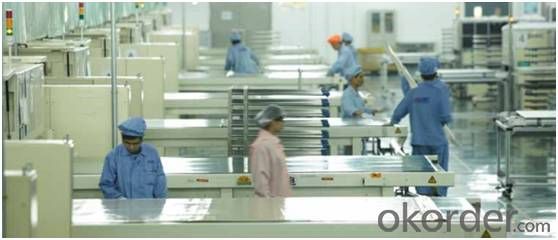
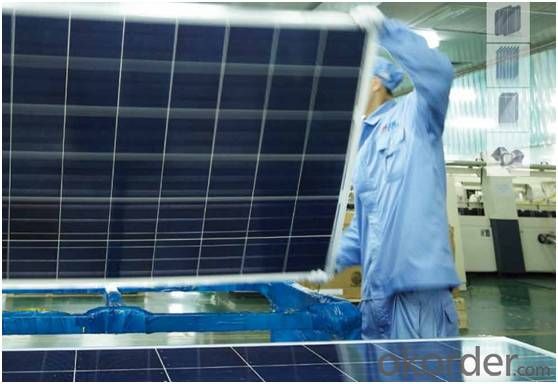
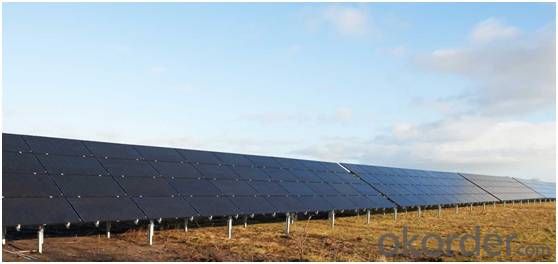
FAQ
Q: How long has Solar PV technology been around?
In 1838 the photoelectric effect was discovered by physicist Edmund Becquerel although it wasn't until the 1950's that the technology was developed enough to produce efficient working cells.
Q: Are Photovoltaic panels expensive?
Over the last 20 years the price of PV modules has fallen dramatically, from around £15 per Wpk in 1980 to current prices of around £3.50 per Wpk.
Q: Will I have to get planning permission?
Not in the vast majority of cases. However if you want your system ground mounted, if your property is part of a world heritage site, or is listed, then planning permission would likely have to be sought in advance.
Q: How long will a Solar PV system last?
The MCS accreditation scheme means that all panels installed under the scheme by approved agents will continue to generate for at least 25 years. Over this time their output will diminish slightly but they should still perform at 85% at the 25 year mark according to the scheme rules.
Q: How much Power can I expect to get from my Solar PV’s?
Typically an installed 1kWpk array will produce 800kWh/year. 2kWpk will produce 1600kWh/year and so on.
- Q: What are the financial benefits of installing solar panels?
- Installing solar panels can provide several financial benefits. Firstly, solar panels allow homeowners to generate their own electricity, reducing their reliance on the grid and potentially lowering their monthly utility bills. Additionally, excess energy produced by solar panels can be sold back to the grid, resulting in potential income through net metering or feed-in tariffs. Moreover, investing in solar panels can increase the value of a property, making it more attractive to potential buyers and potentially leading to higher resale prices. Finally, solar panels can also qualify for various tax incentives, grants, or rebates, further reducing the initial installation costs and providing additional financial savings.
- Q: Can solar panels be used to power a music festival?
- Yes, solar panels can be used to power a music festival. Solar panels generate electricity by converting sunlight into energy, which can be stored in batteries for use during nighttime or cloudy days. By installing a sufficient number of solar panels, a music festival can harness renewable energy to power stages, lighting, sound systems, and other equipment, reducing reliance on traditional power sources and minimizing carbon emissions.
- Q: Hi. I hate the energy company. I hate my carbon footprint. I will likely move to a piece of property and put a decent-sized mobile home on it. I want solar panels so I can get my own power. I live in the state of Wisconsin. How much would this approximately cost? Would I need certain permits? How many panels can be used? Thanks for helping!
- My guess is that you will pick up everything concerning solar power at www.okorder .
- Q: All I ever heard is how easy it is to get solar panels for a persons home. I live in Arkansas and to do my house it would cost 25000 that I dont have and No state incentives. So where do I go and get these free solar panels? Thanks for the help
- How photograph voltaic Cells artwork by making use of Scott Aldous interior this text a million. creation to How photograph voltaic Cells artwork 2. Photovoltaic Cells: changing Photons to Electrons 3. How Silicon Makes a photo voltaic cellular 4. Anatomy of a photo voltaic cellular 5. capability Loss in a photo voltaic cellular 6. photograph voltaic-powering a house 7. fixing photograph voltaic-skill themes 8. photograph voltaic-skill execs and Cons 9. so plenty extra assistance 0. See all actual technology articles you have probable seen calculators that have photograph voltaic cells -- calculators that never choose batteries, and often times do no longer even have an off button. as long as you have sufficient gentle, they supply the impact of being to artwork perpetually. you will possibly have seen larger photograph voltaic panels -- on emergency highway indicators or call boxes, on buoys, even in parking plenty to skill lighting fixtures. regardless of the reality that those larger panels are not as undemanding as photograph voltaic powered calculators, they're obtainable, and not that no longer hassle-free to % out in case you recognize the place to look. There are photograph voltaic cellular arrays on satellites, the place they're used to skill the electrical powered platforms. you have probable additionally been listening to bearing directly to the photograph voltaic revolution for the final 2 a protracted time -- the thought at some point we can all use unfastened electrical energy from the sunlight. that could be a seductive promise: On a vivid, sunny day, the sunlight shines approximately a million,000 watts of capability per sq. meter of the planet's floor, and if shall we assemble all of that capability shall we certainly skill our homes and workplaces for unfastened.
- Q: How do solar panels affect the environment?
- Solar panels have a positive impact on the environment as they generate clean energy from the sun, reducing the reliance on fossil fuels and significantly lowering greenhouse gas emissions. Additionally, solar panels do not produce air or water pollution during operation, and their use helps conserve water resources. However, the manufacturing process and disposal of solar panels do have some environmental impacts, such as the use of certain chemicals and materials. Overall, the benefits of solar panels far outweigh their minimal negative effects.
- Q: How do solar panels generate electricity?
- Solar panels generate electricity through the photovoltaic effect, where sunlight is converted into electricity. The panels consist of multiple solar cells made of semiconductor materials, typically silicon. When sunlight hits the cells, it excites the electrons, causing them to flow and generate an electric current. This current is then captured and used to power various devices or stored in batteries for later use.
- Q: I want to be more self sufficient and get solar panels for electricity in a small house any tips will help. i need to know how many watts is enough and ect.
- It's depends on how many electrical appliances at home. For small house average need 800-200 watts electricity. The average solar panel kits produce 75-50 watts depending on the size of the panel. You needs minimum 5 solar panels.
- Q: Can solar panels be used in remote areas with no access to the grid?
- Yes, solar panels can be used in remote areas with no access to the grid. Since solar panels generate electricity from sunlight, they can provide a reliable and sustainable source of power in off-grid locations. By harnessing the energy of the sun, solar panels can charge batteries or directly power electrical devices, making them an ideal solution for remote areas without access to the traditional power grid.
- Q: Can solar panels be installed on a high-rise building?
- Yes, solar panels can be installed on a high-rise building. In fact, high-rise buildings can be ideal locations for solar panel installation due to their height and large surface areas. By utilizing the available roof space, high-rise buildings can generate significant amounts of solar energy, helping to reduce their reliance on traditional energy sources and lowering their carbon footprint.
- Q: How do solar panels impact the environment?
- Solar panels have a positive impact on the environment as they generate clean and renewable energy without emitting harmful greenhouse gases or pollutants. By reducing the reliance on fossil fuels, solar panels help combat climate change and improve air quality. Additionally, their installation requires minimal land disturbance, and they have a long lifespan, making them a sustainable energy solution.
Send your message to us
Pa Solar Panels - Polycrystalline Solar Module TPB156x156-36-P
- Loading Port:
- Ningbo
- Payment Terms:
- TT OR LC
- Min Order Qty:
- 100 carton
- Supply Capability:
- 10000 carton/month
OKorder Service Pledge
OKorder Financial Service
Similar products
Hot products
Hot Searches
Related keywords
